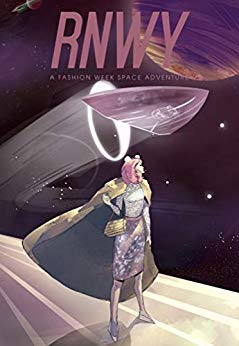RNWY: A Space Adventure received a 4+ star review, making it an IndieReader Approved title.
Following find an interview with author P.A. Lopez.
What is the name of the book and when was it published?
RNWY: A Space Adventure. Published September 14, 2019.
What’s the book’s first line?
“New York was a city where you never ran out of places.”
What’s the book about? Give us the “pitch”.
The year is 2399. Humans’ “biological clocks” have been stopped for more than 250 years, freeing humanity from aging and death. AIs have rights, and can even acquire full citizenship.
It’s also fashion week. Antisocial fashion editor Pablo Starr — who runs Space Fashion Week, via RNWY — is bored and depressed, as usual. He has endless riches, and (like everyone in 2399) doesn’t age, but he’s been searching for his lost love for almost 100 years. Meanwhile, supermodel-turned-reality star Samantha (of mean-spirited holo show Samantha!) is trying to make a name for herself as an inventor, but she’s mocked by the media and her shallow co-workers.
Their lives are connected, and changed, when DOS, an antiquated robot, crashes the Chanel show looking for Samantha.
DOS has a wild story: his owner has been abducted by a Sention sim (a lifelike android made by Fashion Robotics), and Pablo will be next.
What inspired you to write the book? A particular person? An event?
I decided I wanted to get back into writing again after a very long hiatus, and someone told me to “write my fantasy.”
It actually began as a manifestation exercise. If I could be, have, or do, anything, removing “all” (practical) limitations, what would I have?
Then I wondered what if ALL limits were removed? Limits of time and space and current “reality” itself?
I started thinking about the kind of world I wanted to live in. It would be more compassionate. There would be less tribalism, and more empathy. No hunger or need. On the more superficial end of the spectrum — since we were going for a “limitless” fantasy — I would have tons of cool gadgets, and robots.
I’d been thinking about a world without aging for a long time, since back when I was playing music, and I would layer some of those ideas into my songwriting. In 2006 I released an album called Pop Music United that featured Tanya Haden, among others, that explored some of these “sci-fi” themes.
Then in December of 2016 I woke up in the middle of the night and realized fashion week was something I knew about, and I could combine that with some of these fun and philosophical ideas. (Such as if people never die, how does that change our ideas about the afterlife?)
But someone with cool gadgets in a utopian society didn’t make for very thrilling story, so I had to give my characters a problem — actually, several problems — to overcome.
Some of these problems are the same old problems we face today: loneliness; trying to find where we belong; heartbreak.
Some are new problems caused by these future technologies.
But at root they’re HUMAN problems.
Interestingly, even the AIs face “human” problems.
Because “human” problems are actually the same problems anything with self-awareness faces.
Even animals have them: they just don’t have the language to express them. So really they’re “conscious being” problems.
What’s the main reason someone should really read this book?
As preparation for the future.
“AI” is coming, and scientists are working to stop the biological clock, as well.
When you see otherwise-terrific science-fiction franchises such as Star Trek, the one thing that’s always conveniently sidestepped is the number one technological development most in demand: to no longer age.
If a society can invent a transporter, stopping the biological clock should be a relatively easy feat, no matter how far-fetched it may seem now.
But the questions attached to that are so weighty: a) It makes us sad that we don’t have that option now; b) makes us wonder if “never dying” something we truly even WANT; and c) brings up a lot of disturbing questions about what an afterlife might mean if we “never” get there.
I wanted to explore these ideas in a way that was palatable and FUN. (Because the book was supposed to be fun.)
Humans have coped with so many revolutionary changes already: we’ll adjust to these, as well.
I wanted to show a society on the “other side” of that: where it’s just common knowledge, and life goes on.
In the case of RNWY, the society is beset by other problems: complacency; triviality. So the book is a “coming of age” story for that society, as they realize their apathy also has a price.
What’s the most distinctive thing about the main character? Who-real or fictional-would you say the character reminds you of?
Samanths is an amalgam of several amazing people I’ve known. She’s got street smarts, and is stubborn, pushy, and willful to the point of being rude. But she’s also intellectual, compassionate, and fiercely loyal to her friends, almost to a fault. (A lot of it stems from abandonment issues tied to her past that are more fully explored in Book 2, in progress.)
Someone named “Pablo Starr” is also in the book, which is a name I’ve used in conjunction with my fashion projects. This character isn’t “me,” but — sometimes I think — is a kind of warning to myself.
When I was creating this “Pablo Starr” (and often I think I should have chosen another name!), to develop the character, I let myself imagine what I might be like if I let cynicism or heartbreak take away my joy and optimism.
This character still has a good heart: but he’s let heartbreak create a wall between himself and the world.
To create a good character arc, a protagonist needs a “splinter”: something that needs to change. So I had to give him a splinter in order to have something worth writing about.
Ultimately books — even science fiction books — aren’t about gizmos and space battles.
They’re about character transformation.
If they made your book into a movie, who would you like to see play the main character(s)?
It will be a movie, actually! I’m at work on the screenplay now.
I’d probably prefer to see “unknowns”. Star Wars seemed more “real” because the actors were essentially unknown.
I think James Gunn or Karen Gillan would be interesting choices to direct.
But a lot of directors would do great with it.
When did you first decide to become an author?
I think I was 12.
Is this the first book you’ve written?
I wrote a couple of books when I was a teenager, but they weren’t very good.
Even back then, people compared my writing to Hitchhiker’s Guide to the Galaxy! But the funny thing is, I’ve never read those books.
I used to read a book series called MythAdventures by Robert Asprin, and I think maybe those were inspired by Douglas Adams? I don’t really know.
Since then I’ve flipped through some Douglas Adams books and they’re hilarious. But I’ve never read more than a few pages, for whatever reason. Maybe I’m afraid of unintentionally becoming “more” derivative!
What do you do for work when you’re not writing?
I own Fashion Week Online. I tend to have a lot of random projects, and this is one of them.
How much time do you generally spend on your writing?
My motto is to do a little something every day, even if it’s just “looking” at whatever I’m working on.
I once read that whatever you’re doing, make it so easy that you can’t dread it or get out of it.
Just do something, pat yourself on the back, and if you want to keep going, keep going. If not stop.
No stress allowed.
My motto is: “Follow the fun.”
As soon as it stops being fun, try something else.
If it’s not fun, why do it?
It’s worth repeating: Follow the FUN!
Would you go traditional if a publisher came calling? If so, why?
Of course! Traditional publishers can push you in a way you can never do yourself.
Is there something in particular that motivates you (fame? fortune?)
My number one interest is promoting the idea that science and spirituality aren’t in competition. They’re parts of a whole.
“Metaphysics” is a term often used to describe spirituality. “Meta-” means beyond. So the whole conversation about the ethical or “spiritual” aspect of existence doesn’t need to be explained in scientific terms. It is literally a separate topic than science, although — interestingly — it is intertwined.
I believe spirituality (in my terms, “how we respect the autonomy and growth of others”) is foundational. I believe the universe was created to fulfill a spiritual purpose, and the “spiritual experience” of our lives (our own “character arc”) follows a kind of “spiritual topography.”
As surely as water flows downhill, or over rocks, the ethical choices we make affect the course of our lives.
We aren’t meant to do it perfectly: the whole point is the journey.

